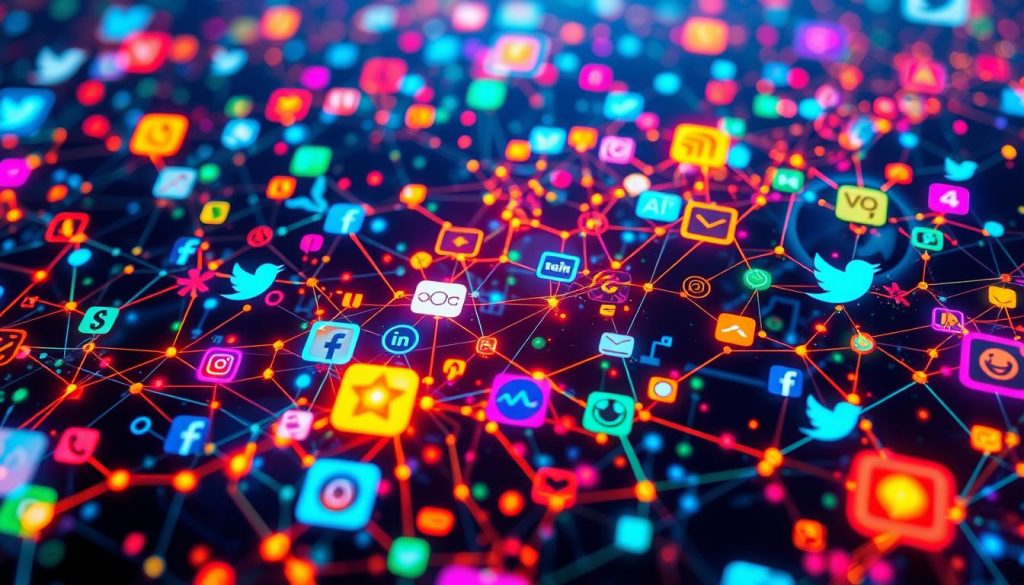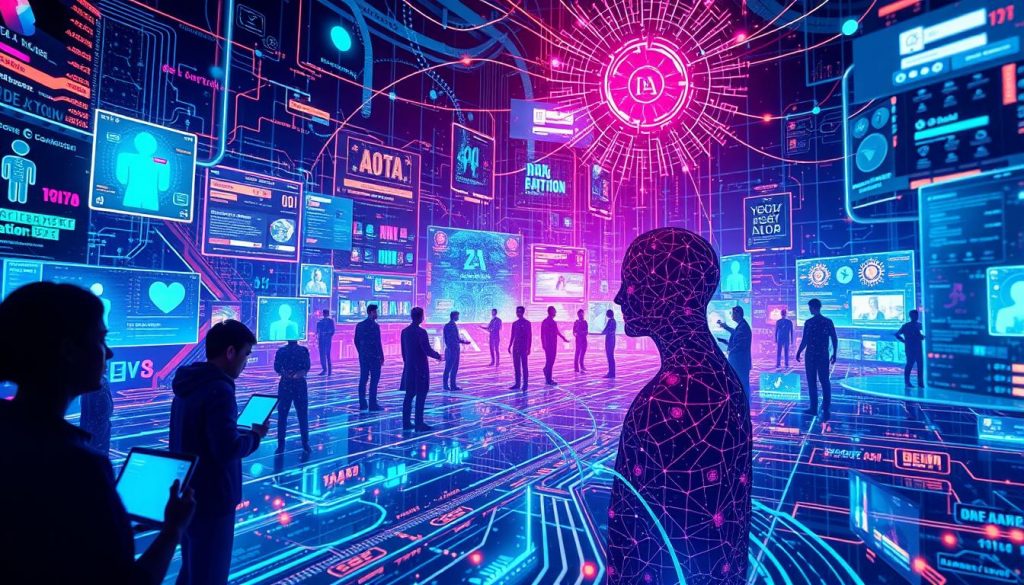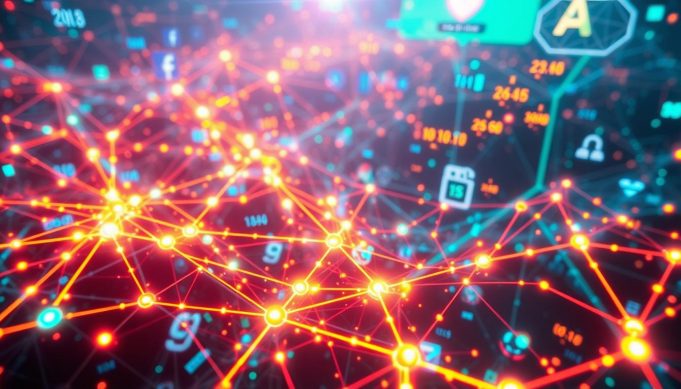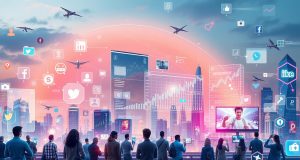In the fast world of social media, content is everything. But how well do we know the algorithms that shape our online experiences? Are we just pawns in their game, or can we use their power for our own gain?
We’ll explore the heart of AI-driven social media algorithms. We’ll look at their key features, their history, and how they change how we see and interact with online content12. Let’s dive into the world of these powerful tools. We’ll see how businesses, creators, and users can use social media to their advantage.
Key Takeaways
- AI-driven algorithms are the heart of today’s social media, making sure we see content that interests us.
- These algorithms study our actions, likes, and shares to guess what we’ll like next and show it to us.
- Knowing how AI algorithms work can help businesses and creators reach more people.
- It’s important to deal with AI’s downsides, like bias and privacy issues, to keep social media healthy.
- The future of social media algorithms will likely see more advanced AI and a focus on fairness.
What Are AI-Driven Social Media Algorithms?
AI-driven social media algorithms are complex systems that help platforms show users the best content. They look at what users have liked before, how relevant the content is, and how popular it is. This makes sure users see content that interests them the most3.
These algorithms have changed social media a lot. Now, instead of just showing posts in order, they use AI to guess what users will like. This makes social media more personal and fun.
Definition and Overview
At their heart, AI-driven social media algorithms aim to make the user experience better. They use smart learning to look at lots of data, like how users interact with content4. This helps them figure out what users like and show them more of that.
Historical Context and Evolution
The use of AI in social media started in the early 2010s. Platforms wanted to deal with the huge amount of content and keep users interested34. They moved from just showing posts in order to using AI to pick the best content for each user.
Now, AI is key to popular platforms like Twitter, Facebook, Instagram, and TikTok34. These algorithms keep getting better, thanks to new AI and machine learning tech. They get even better at showing users content they’ll love.
“Social media platforms use AI to dictate what content surfaces in users’ feeds, moderate comments, and suggest content and accounts that users might like.”4
The Role of AI in Social Media
Artificial Intelligence (AI) has changed social media a lot. It helps users find content they like and makes platforms better. AI is key in making social media more personal and fun5.
How AI Analyzes User Behavior
AI looks at how users interact with content. It checks likes, shares, and how long they spend on posts. This helps platforms understand what users like6.
With this info, platforms can guess what users might like next. They can then show them content that fits their interests. This makes users happier and more engaged5.
Predictive Modeling in Content Delivery
AI uses predictive models to guess what users might like. This means users see content that really speaks to them6. Over time, these guesses get better, making the experience even more personal5.
AI is changing social media in big ways. It helps with everything from recommending content to making ads better7. By using AI, platforms can understand their users better. This leads to more relevant content and a better experience for everyone6.
| AI-Powered Social Media Features | Benefits |
|---|---|
| Personalized Content Recommendations | Improved user engagement and platform stickiness |
| Automated Content Creation | Increased productivity and efficiency for content creators |
| Real-Time Sentiment Analysis | Ability to monitor and respond to public sentiment quickly |
| Optimized Advertising Campaigns | Increased ad relevance and higher conversion rates |
As AI’s role in social media grows, creators and marketers need to keep up7. Using AI tools can help them reach more people and do better in the fast-changing world of social media6.
“AI is not just a technology, but a revolution that is transforming the way we experience and interact with social media.”
Key Features of AI-Driven Algorithms
Social media platforms are changing fast, and AI algorithms are playing a big role. These algorithms make content more personal for each user8. Now, more social media algorithms are AI-driven, making experiences more tailored8.
Personalization and Customization
AI algorithms are great at understanding what users like. They look at how users interact with content to make it more personal9. This means users see content that they’re more likely to enjoy, making their experience better.
Content Ranking and Visibility Patterns
AI algorithms also decide what content to show in feeds9. They check how users react to content in real time9. This helps platforms show users content that’s more relevant and timely8.
Brands that focus on a few main topics tend to get more engagement8. Using different types of content, like stories and videos, also boosts engagement8. AI algorithms favor content that sparks conversations, showing the value of human interaction8.
As social media grows, AI algorithms will play an even bigger part9. AI tools keep an eye on how well content is doing, giving insights to improve strategies910. Top marketers use AI more than others, and many automate their social media tasks10. Brands should use AI to make their content more discoverable by the right people8.
| Feature | Description |
|---|---|
| Personalization and Customization | AI-driven algorithms analyze user data and preferences to deliver highly personalized content, enriching the user experience. |
| Content Ranking and Visibility Patterns | AI algorithms use various signals, such as engagement, relevance, and timeliness, to rank and prioritize content, influencing its visibility in user feeds. |
Major Platforms Utilizing AI Algorithms
Social media giants are using artificial intelligence (AI) to make our online experience better. Facebook, Instagram, Twitter, and TikTok are all powered by AI. This technology helps find and show us content we’ll love11.
Facebook and Instagram
Facebook and Instagram use AI to pick the right content for you. They look at what you like and do online. This way, you see posts that really interest you12.
Instagram’s search feature is also better thanks to AI. It helps you find videos and photos that match what you like12.
Twitter’s Algorithm Updates
Twitter uses AI to pick the best tweets for you. It looks at how interesting and timely the tweets are. This makes your Twitter feed more personal13.
TikTok’s Content Distribution
TikTok’s “For You Page” is powered by AI. It finds new and fun videos just for you. The AI checks what you watch and like to keep you engaged13.

AI is making social media even better. These platforms are getting smarter at showing us content we’ll enjoy. The future of social media is all about AI and making things more personal for us11.
| Platform | Key AI Algorithm Features |
|---|---|
| Facebook and Instagram | Personalized feed, enhanced search, content moderation |
| Relevance-based ranking, contextual understanding | |
| TikTok | Hyper-personalized “For You Page,” video quality analysis |
Benefits of AI-Driven Algorithms for Users
Social media is changing fast, thanks to AI algorithms. These smart tools make our online experience better. They help us find interesting content easily, making our digital world more fun and personal.
Enhanced User Experience
AI algorithms are great at showing us content we’ll like. 75% of marketers plan to use AI to make social media better for customers14. They learn what we like and show us more of it, making our time online more enjoyable.
Discovering Relevant Content
AI algorithms are also key in finding new things for us to see. Brands using AI for social media save 50% on making content15. They help us discover new accounts and trends, making our online world more exciting.
AI also helps businesses give us content we’ll love. AI algorithms predict what we’ll like based on what we’ve liked before14. This makes our online experience better and helps us connect more with brands.
As social media grows, AI algorithms will be even more important. They help make our online experience better, helping us find new things and connect with brands. This makes social media more fun and keeps us coming back for more.
Challenges and Limitations
AI-driven social media algorithms have made content curation and personalization better. Yet, they also bring challenges and limitations for platforms and users16. These include worries about algorithmic bias, data privacy, and the ethics of AI decisions.
Algorithm Bias and Fairness
AI algorithms can carry and grow biases from their training data16. This can cause unfair content distribution, leaving out some groups or views. Social media platforms face a big challenge to ensure fairness and reduce biases for everyone’s benefit.
Privacy Concerns and Data Usage
The need for lots of data for personalized content raises big privacy worries16. There have been many data breaches and misuse of user data, hurting trust. Social media sites must balance personalization with keeping user data safe and transparent.
AI tools in social media marketing also pose privacy risks, like sharing sensitive info by mistake17. It’s key for platforms and marketers to focus on user privacy and follow strict data handling rules to keep trust.
As AI in social media keeps improving, tackling these issues and sticking to ethical AI use is vital. This will help platforms keep user trust, offer fair and inclusive experiences, and use AI responsibly1617.
| Challenges | Limitations |
|---|---|
| Algorithmic bias and fairness | Spread of misinformation and false news |
| Privacy concerns and data usage | Addiction and mental health issues |
The Impact on Content Creators
Social media algorithms, powered by AI, are changing how we share content. Creators need to adjust their plans to keep up. Knowing how these algorithms affect reach and engagement is key to staying connected with fans18.
Understanding Reach and Engagement
AI looks at what users like to show them more of. Creators must make content that people want to see. They can use AI tools to see what works best and when to post18.
How Creators Can Adapt Strategies
To thrive with AI, creators must keep their content fresh and engaging. They should use special features on platforms and keep up with algorithm updates18. AI tools can help with the busy work, so creators can focus on making great content19.
AI is also making it easier and cheaper for creators to make content19. By using AI analytics and tools, creators can improve their strategy. This helps them reach more people and connect better with their audience1819.
But, AI raises big questions like bias, privacy, and who owns what19. Creators must find a way to use AI wisely. They need to make sure their strategies are both smart and fair.
“87% of users use social media for decision-making according to top social media trends in 2022.”18
By understanding AI’s role and adjusting their plans, creators can do better. They can reach more people, get more engagement, and succeed in the changing world of social media.
Future Trends in Social Media Algorithms
The digital world is always changing, and AI in social media is no exception. New tech like deeper learning and better natural language processing will make social media more personal and fun for users20.
Evolving AI Technologies
The AI in social media market is set to hit USD 27.67 Billion by 2032, growing fast20. With over 4.48 billion people using social media, AI will help platforms understand what each user likes20.
The Influence of Ethical Considerations
AI in social media will make ethical issues more important. Platforms will have to show diverse content to avoid echo chambers and biases21. They’ll also focus on being clear about how they use user data21.
By 2025, AI will be key in social media algorithms21. They’ll use AI to make content that fits what users like, based on their actions and interests21.

Social media will have to balance personal content with diverse views21. This is key to avoiding echo chambers and ensuring fairness and transparency21.
The future of AI in social media looks bright, with more personalized experiences2021. But, it’s important to develop AI ethically. This way, social media can keep improving and meet user needs2021.
AI and Mental Health on Social Media
Social media has changed how we interact and consume content. While it offers many benefits, AI algorithms’ impact on mental health is a growing concern22. With over 3.78 billion users worldwide, spending an average of 145 minutes daily, it’s important to balance user engagement and digital wellbeing.
Balancing Engagement with Wellness
Social media platforms are working to reduce the negative effects of their algorithms on mental health22. For example, TikTok and Pinterest now provide information on hotlines and support resources for self-harm, suicide, depression, and eating disorders22. AI is also used to classify comments with negative sentiment to reduce cyberbullying22.
Curbing Negative Effects of Algorithms
AI algorithms can help reduce the negative effects of social media usage22. They can filter out harmful content and encourage users to think before they act, making for a healthier online experience22. Yet, the addictive nature of social media is a big challenge that needs a multi-faceted approach.
The impact of social media on mental health is complex. It can lead to lower self-esteem, depressed mood, and decreased life satisfaction due to social comparison22. Image-based apps with AI can also distort body image and promote disordered eating behaviors22. It’s essential to find a balance between minimizing harm and promoting well-being on social media platforms22.
As AI evolves in mental health care23, more research is needed to understand its impact on mental health22. This will help develop targeted strategies for a healthier online experience23.
AI in mental health care is promising, with the market expected to grow at a CAGR of 39.1% from 2022 to 202723. As AI solutions change mental healthcare, it’s vital to focus on ethical considerations and user well-being24.
| Industry | AI Applications |
|---|---|
| Healthcare | AI-powered diagnostic tools using image recognition and natural language processing for precise disease detection and treatment planning24. |
| Manufacturing | AI-driven maintenance for reduced downtime and optimized production processes24. |
| Finance | AI algorithms for detecting fraud, risk assessment, and improving security and stability24. |
| Mental Health | AI-driven solutions for better accessibility, personalization, and effectiveness in mental health interventions, including wearable devices for real-time data23. |
“AI has the power to change mental healthcare, as shown in a World Health Organization study on AI in mental health research.”23
As AI adoption grows across industries24, it’s key for organizations to focus on ethical AI practices and policies24. By balancing innovation with user well-being, we can use AI to improve the digital experience and support mental health on social media platforms.
Strategies for Businesses and Brands
In today’s world, AI helps businesses and brands improve their social media game. By understanding the algorithms of platforms like Facebook and Instagram, they can make content that gets noticed. This leads to more people seeing their posts, engaging with them, and making purchases.
Leveraging Algorithms for Marketing
To use AI for marketing well, businesses should make content that fits each platform’s style. This means using popular topics, videos, and posting regularly25. AI tools help by analyzing lots of data to make campaigns more personal. They also save time by automating tasks like writing emails.
Measuring Algorithmic Success
It’s important to check how well AI marketing works. By looking at metrics like reach and engagement, businesses can see what’s working25. The Sprout Social Index™ shows that making content is the biggest challenge, but AI tools like ViralPost™ help find the best times to post25. AI chatbots also offer quick customer support, making shopping easier.
To keep AI marketing effective, businesses need to be open about using AI and keep data safe25. Being honest and secure builds trust with customers. AI marketing boosts brand awareness, engagement, and ad effectiveness, helping businesses stay ahead online.
| Key Strategies for AI-Driven Marketing | Benefits of Measuring Algorithmic Success |
|---|---|
|
|
By using AI algorithms and checking their success, businesses can improve their marketing. A social media audit finds where AI can help most, and25 checking current tech can spot gaps and inefficiencies.
Successful AI marketing needs a deep understanding of algorithms and a focus on data. It’s also key to be open and ethical25. Finding the right AI tools and managing data well are essential. Testing AI tools and introducing them slowly across the team is also important.
“Leveraging AI-driven algorithms is no longer an option, but a necessity for businesses looking to stay competitive in the digital age. By embracing these powerful tools, brands can unlock new levels of customer understanding, content optimization, and marketing success.”
As the digital world keeps changing, businesses that use AI wisely will thrive. They’ll connect better with their audience, boost their brand, and grow sustainably.
Conclusion: The Future of Social Media Algorithms
AI-driven algorithms have deeply changed social media. They will keep having a big impact26. Billions of people use Facebook, Instagram, and Twitter every day. AI helps make their experience better by showing them content they like26.
Key Takeaways
We’ve learned a lot about AI in social media. It’s key to keep up with changes and balance personalization with privacy27. AI is also making content, like news and ads, more personal27.
As AI gets stronger, creators and businesses need to be quick to adapt. This ensures their plans work well.
Final Thoughts on AI’s Role in Social Media
AI will likely become even more important in social media soon. It could change how we see and interact with content27. We might see more content made just for us, AI helping during live events, and better moderation of content27.
As social media keeps changing26, AI will be more and more important. It will shape our online world and how we interact with it26.
FAQ
What are AI-driven social media algorithms?
How do AI algorithms analyze user behavior?
What are the key features of AI-driven algorithms?
Which major platforms utilize AI algorithms?
What are the benefits of AI-driven algorithms for users?
What are the challenges and limitations of AI-driven algorithms?
How can content creators adapt to AI-driven algorithms?
What are the future trends in social media algorithms?
How do AI-driven algorithms impact mental health on social media?
How can businesses leverage AI-driven algorithms for marketing?
Source Links
- Social Media Algorithms and AI: A Marketer’s Guide
- 2024 Social Media Algorithms: A Guide for All Networks
- How to Rise Above Social Media Algorithms
- What Is Artificial Intelligence for Social Media?
- How AI Is Reshaping Social Media Platforms And 5 Tips For Success
- Explore the Power of AI in Social Media: A Complete Guide
- The Role of AI in Social Media Marketing 2024 – Marketing Insider Group
- Increasing Social Media Impact With AI-Driven Strategies.
- Social Media AI
- Automate Social Media with AI: A Complete Guide | Copy.ai
- How the 5 Biggest Social Media Sites Use AI – AI Time Journal – Artificial Intelligence, Automation, Work and Business
- The Rise of AI Integration in Social Media Platforms – Green Closet Creative
- Decoding Social Media Algorithms: What You Need to Know for 2025
- Unleashing the Power of AI in Social Media: A Complete Guide
- 10 Ways to Use AI in Social Media | Sprinklr
- AI in Social Media: The Benefits and Risks — Inspirit AI
- AI in Social Media: Exploring Use Cases, Challenges, & Strategies
- Impact of Artificial Intelligence (AI) in Social Media Management
- How AI Impacts Social Media Content Creation
- Future of Social Media: Top Trends to Watch for 2024 | Sprinklr
- Cracking Social Media Algorithms in 2025
- A Psychiatrist’s Perspective on Social Media Algorithms and Mental Health
- The Impact of AI in Mental Health
- Artificial intelligence in positive mental health: a narrative review
- Designing an AI marketing strategy for social media: An expert guide
- Exploring the Role of AI in Shaping Social Media’s Future
- AI-Generated Content: The Future of AI?












